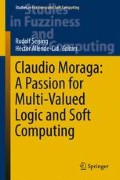Abstract
In this contribution we deal with a global monotonicity condition for the class of associative extended aggregation functions. We insist on the idea that global monotonicity can be taken as a minimum requirement for an extended aggregation function to be considered consistent.
Access this chapter
Tax calculation will be finalised at checkout
Purchases are for personal use only
Notes
- 1.
Reflexive and transitive.
- 2.
A t-norm is a two-variable function \(T:[0,1]^{2}\longrightarrow [0, 1]\) which is associative, symmetric, increasing in each variable and has neutral 1.
- 3.
The minimum t-norm (\(T(x_{1},x_{2})=min(x_{1},x_{2}))\) is the only idempotent t-norm.
- 4.
A t-conorm is a two-variable function \(S:[0, 1]^{2}\longrightarrow [0, 1]\) which is associative, symmetric, increasing in each variable and has neutral 0.
- 5.
The maximum t-conorm (\(S(x_{1},x_{2})=max(x_{1},x_{2}))\) is the only idempotent t-conorm.
- 6.
A mixed aggregation function exhibits different types of behavior on different parts of the domain.
- 7.
A uninorm is a two-variable function \(U:[0,1]^{2}\longrightarrow [0, 1]\) which is associative, symmetric, increasing in each variable and has neutral e belonging to [0, 1].
- 8.
A nullnorm is a two-variable function \(V:[0, 1]^{2}\longrightarrow [0, 1]\) which is associative, symmetric, increasing in each variable and has absorbent a belonging to [0, 1].
References
Calvo, T., Carbonell, M., Canet, P.: Medias Casilineales Ponderadas Extendidas. Proc. Estylf’97, Tarragona pp. 33–38 (1997).
Calvo, T.: Two ways of generating Extended Aggregation Functions. Proc. IPMU’98, Paris, pp. 825–831 (1998).
Calvo, T., Mayor, G.: Remarks on two types of Extended Aggregation Functions. Tatra Mount. Math. Publ. 16–1, 235–255 (1999).
Calvo, T., Mayor, G., Torrens, J., Suñer, Mas, M., Carbonell, M.: Generation of Weighting Triangles Associated with Aggregation Functions. International Journal of Uncertainty, Fuzziness and Knowledge-Based Systems 8 (4), 417–452 (2000).
Mas, M., Mayor, G., Suñer, J., Torrens, J., Generación de funciones de Agregación Extendidas. Proc. Estylf’97, Tarragona, pp. 39–44 (1997).
Mayor, G., Calvo, T.: On Extended Aggregation Functions. Proc. Seventh IFSA Congress Vol. 1, Prague, pp. 281–285 (1997).
Suñer, J.: Funcions d’Agregació Multidimensionals. Ph.D. (in Catalan) (2002).
Pursiainen, H.: Consistency in aggregation, quasilinear means and index numbers. Discussion paper No. 244, University of Helsinki and HECER (Helsinki Center of Economic Research) (2008).
Rojas, K., Gómez, D., Montero, J., Tinguaro, J.: Strictly stable families of aggregation operators. Fuzzy Sets and Systems 228, 44–63 (2013).
Beliakov, G., Pradera, A., Calvo, T.: Aggregation Functions A Guide for Practitioners. Beliakov, G., Pradera, A., Calvo, T. (eds.) Springer, New-York, (2007).
Calvo, T., Mayor, G. and Mesiar, R. (eds.): Aggregation operators, New Trends and Applications, Physica-Verlag, Heidelberg, (2002).
Grabisch, M., Marichal, J.-L., Mesiar, R. and Pap, E.: Aggregation Functions. Cambridge University Press, (2009).
Torra, V., Narukawa, Y.: Modeling decisions information fusion and aggregation operators. Springer, New York (2007).
Calvo, T., Mayor, G. and Suñer, J.: Monotone Extended Aggregation Functions. In Enric Trillas: A Passion for Fuzzy Sets. Springer, New York, pp. 49–66, (2015).
Yager, R.R.: On Ordered Weighted Averaging Operators in Multicriteria Decisionmaking. IEEE Transactions on Systems, Man and Cybernetics 18, 183–190 (1988).
Carbonell, M., Mas, M., Mayor, G.: On a class of Monotonic multidimensional OWA Operators. Proc. Sixth IEEE Int. Conference on Fuzzy Systems, Barcelona, pp. 1695–1700, (1997).
Ruiz-Aguilera, D., Torrens, J., De Baets, B., Fodor, J.: Some Remarks on the Characterization of Idempotent Uninorms. IPMU 2010, LNAI 6178, 425–434 (2010).
Acknowledgments
The authors have written this contribution in tribute to Prof. Claudio Moraga in recognition of his important and extensive research in many areas of Soft Computing. This contribution has been partially supported by the Spanish Grant TIN2013-42795-P.
Author information
Authors and Affiliations
Corresponding author
Editor information
Editors and Affiliations
Rights and permissions
Copyright information
© 2017 Springer International Publishing AG
About this chapter
Cite this chapter
Calvo, T., Mayor, G., Suñer, J. (2017). Associative Globally Monotone Extended Aggregation Functions. In: Seising, R., Allende-Cid, H. (eds) Claudio Moraga: A Passion for Multi-Valued Logic and Soft Computing. Studies in Fuzziness and Soft Computing, vol 349. Springer, Cham. https://doi.org/10.1007/978-3-319-48317-7_18
Download citation
DOI: https://doi.org/10.1007/978-3-319-48317-7_18
Published:
Publisher Name: Springer, Cham
Print ISBN: 978-3-319-48316-0
Online ISBN: 978-3-319-48317-7
eBook Packages: EngineeringEngineering (R0)

